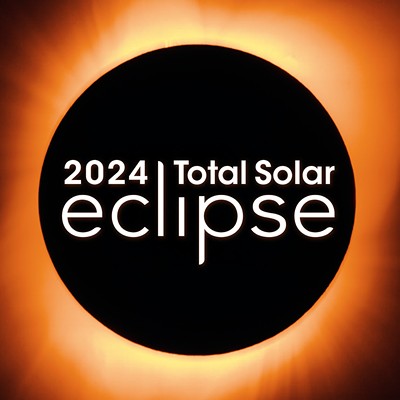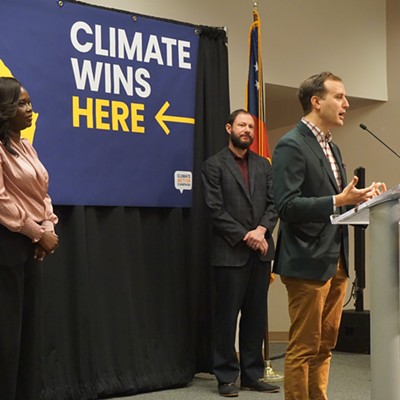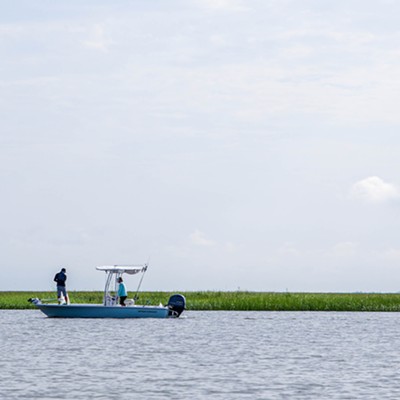This past February, a month before the one–year anniversary of the Fukushima meltdown, the U.S. Nuclear Regulatory Commission (NRC) gave a Georgia Power–led consortium the green light to add two new nuclear reactors to the existing two at Plant Vogtle on the Savannah River.
Aside from the tone–deaf timing, the permitting of the reactors is extraordinary for several reasons.
Vogtle’s new reactors are the first to be licensed in the U.S. in over 30 years. The NRC issued its last license in 1978, the year before the partial meltdown at Three Mile Island in Pennsylvania ushered in atomic energy’s dark ages. The 1986 Chernobyl meltdown in Russia kept the industry there for the next decade.
As memory of the accidents faded, the U.S. political machine got behind nuclear, labeling it carbon–free and selling it to the public as “clean and safe,” even as piles of radioactive waste grew and water sources became tainted with radioactive effluent.
But energy production is a dirty business, and tradeoffs are necessary to meet needs. Compared to the consequences of burning coal, nuclear doesn’t look so bad. Until the unthinkable happens, as it did in Japan. With nearly 200,000 people displaced and tens of thousands of acres poisoned beyond habitation, we’re reminded that no matter what utilities or politicians say, nuclear energy is neither safe nor clean.
Like Three Mile Island and Chernobyl, Fukishima proves that accidents are unforeseeable. A handful of countries are determining that the risks of nuclear energy are too great.
Germany, for instance, has committed to phasing out nuclear energy and rebuilding its electrical grid to connect wind farms and solar arrays. Anyone who says this isn’t feasible needs to consider that the World Economic Forum ranks Germany’s infrastructure as the finest in the world.
Here in the U.S. things are different.
Not only are U.S. taxpayers loaning Georgia Power over $8 billion to build two new reactors, Georgia Power customers are paying finance costs as well. No wonder there is a nuclear renaissance — it’s a goldmine for utility companies.
Tasked with regulating and upholding safety policies, the NRC has become known as the lap dog of the nuclear energy industry. Of the 71 aging nuclear plants that have sought a 20–year extension to their expiring 40 year permits, NRC has granted every single one a renewal license, even when violations were evident.
Although the original two Vogtle reactors aren’t up for renewal for another decade, they routinely violate NRC requirements and have suffered multiple reactor trips caused by both human error and mechanical failures.
As it does with most reactor violations, the NRC deems these violations as “low safety significance,” giving Georgia Power a pass on citations.
Ironically, and somewhat inauspiciously, the NRC found the two new Vogtle reactors in violation of regulations even before they were officially licensed. Specifically, Georgia Power was cited for inadequate procedures to receive, inspect and store building materials. Not long after this violation, NRC licensed the new reactors.
Before Fukushima, Vogtle was a certainty. But after, it was stunning to realize that business was as usual in Washington. The “it can’t happen here” machine was working overtime.
NRC chairman Gregory Jazcko was the one dissenting vote in permitting Vogtle, saying “There are significant safety enhancements that have already been recommended as a result of learning the lessons from Fukushima. Knowing this, I cannot support issuing this license as if Fukushima had never happened.”
Once Vogtle’s two new reactors go online in four to five years, Savannah will be downstream to the largest nuclear power plant in the U.S.
Because regulators, politicians and Georgia Power are committed to nuclear at any cost and risk, the public is left with little hope beyond that the nuclear renaissance in the U.S. will give way to the age of reason before the next unthinkable happens.
Stacey Kronquest is on the Coastal Group Sierra Club Executive Committee























